
Studi Musicali-Nuova Serie
Scope & Guideline
Elevating Scholarly Discourse in Music
Introduction
Aims and Scopes
- Historical Musicology:
The journal emphasizes the study of music within its historical context, examining how music reflects and influences the cultural and societal values of its time. - Analysis of Musical Forms:
There is a consistent focus on the analysis of musical forms and structures, particularly in relation to specific composers, styles, and historical movements. - Interdisciplinary Approaches:
The journal promotes interdisciplinary research, integrating insights from anthropology, sociology, and cultural studies to provide a multidimensional understanding of music. - Rediscovery of Historical Works:
A significant aim is to uncover and analyze lesser-known or forgotten works, contributing to the broader understanding of musical heritage and its evolution. - Sociocultural Contexts of Music:
The journal explores the interplay between music and society, including how socio-political factors shape musical practices and compositions.
Trending and Emerging
- Socio-Anthropological Contexts:
There is a rising interest in examining the socio-anthropological contexts of music, as evidenced by studies that explore the relationships between music, culture, and society, particularly in historical contexts. - Rediscovery and Analysis of Historical Sources:
Recent articles emphasize the importance of rediscovering and analyzing historical musical sources, fostering a deeper understanding of past musical practices and their relevance today. - Interdisciplinary Research:
An emerging trend is the integration of interdisciplinary methods, combining musicology with other fields such as sociology, cultural studies, and anthropology to enrich musicological discourse. - Focus on Specific Composers and Regions:
There is a noticeable trend towards in-depth studies of specific composers and regional musical practices, highlighting the significance of localized musical histories. - Thematic Studies on Gender and Music:
Recent publications have begun to explore the intersections of gender and music, examining how gender roles and identities are represented and constructed within musical contexts.
Declining or Waning
- Contemporary Popular Music Studies:
There has been a noticeable decrease in articles addressing contemporary popular music, indicating a potential shift back towards classical and historical music forms. - Performance Practice:
Studies specifically centered on performance practice have become less frequent, suggesting a waning interest in this aspect of musicology in favor of more theoretical or analytical approaches. - Technical Music Analysis:
While technical analysis is still present, there appears to be a decline in the focus on purely technical aspects of music, such as detailed harmonic or rhythmic analysis, in favor of broader cultural perspectives. - Music Education:
Research related to music education methodologies and practices has diminished, possibly reflecting a shift in focus towards historical and theoretical studies. - Ethnomusicology:
Although still relevant, ethnomusicological studies have decreased, indicating a possible trend towards more Western classical music-focused research.
Similar Journals
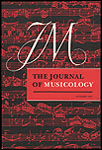
JOURNAL OF MUSICOLOGY
Innovating Methodologies in the Study of MusicJOURNAL OF MUSICOLOGY, published by UNIV CALIFORNIA PRESS, stands as a premier academic forum for the exploration and dissemination of research in the field of musicology. With an ISSN of 0277-9269, this journal provides a vital platform for scholars, practitioners, and educators to engage with contemporary and historical music studies. The journal, which has been publishing significant works since 1982 and continues through to 2024, boasts a commendable Q2 ranking in Music and holds a notable position within the 68th percentile of Scopus rankings for Arts and Humanities, specifically in Music. Although it does not offer open access, the journal remains a crucial resource for those dedicated to advancing the understanding of musical heritage, theory, and practice. The JOURNAL OF MUSICOLOGY aims to foster interdisciplinary dialogue and promote innovative methodologies within the field, thereby making it an essential read for all engaged in the scholarly pursuit of music.
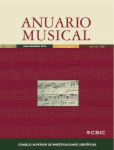
Anuario Musical
Bridging theory and practice in Music and Visual Arts.Anuario Musical, with its ISSN 0211-3538 and E-ISSN 1988-4125, is a prestigious journal in the fields of Music, Visual Arts, and Performing Arts, published by CONSEJO SUPERIOR INVESTIGACIONES CIENTIFICAS-CSIC in Spain. Since becoming an Open Access journal in 1995, it has played a crucial role in disseminating cutting-edge research and fostering scholarly communication in these dynamic disciplines. The journal has achieved notable rankings in the 2023 category quartiles, being placed in Q2 for Music and Q1 for Visual Arts and Performing Arts, reflecting its commitment to high-quality scholarship. Furthermore, it is indexed in Scopus with respectable ranks—#294/667 in Visual Arts and Performing Arts and #105/180 in Music—underscoring its relevance in the global academic landscape. Between 2011 and 2023, Anuario Musical has published a diverse range of articles that contribute significantly to the understanding and appreciation of music and the arts, making it an essential resource for researchers, professionals, and students alike. For more details, the journal is based at Editorial CSIC, C/VITRUVIO 8, 28006 MADRID, SPAIN.

Vestnik Sankt-Peterburgskogo Universiteta-Iskusstvovedenie
Celebrating the Intersections of History and Artistic InnovationVestnik Sankt-Peterburgskogo Universiteta-Iskusstvovedenie, published by ST PETERSBURG UNIV PRESS, is a distinguished academic journal based in the Russian Federation, focusing on the interconnected disciplines of Conservation, History, Music, and Visual Arts and Performing Arts. With an ISSN of 2221-3007 and E-ISSN of 2542-2243, this journal plays a vital role in disseminating scholarly research and fostering dialogue across these fields. Despite being categorized in the third quartile (Q3) in 2023 across its respective disciplines, its significance lies in publishing emerging research and critical analyses that contribute to the academic discourse. The journal accepts submissions until the converged years spanning 2016 to 2024, making it a relevant platform for current academic inquiry. Although it currently does not offer open access, the journal provides robust insights for researchers, professionals, and students eager to explore the nuances of cultural heritage and artistic expression. As it continues to develop its impact within the arts and humanities, Vestnik Sankt-Peterburgskogo Universiteta-Iskusstvovedenie remains an essential resource for those passionate about understanding and preserving the rich tapestry of artistic endeavors.

MUSIK IN BAYERN
Discovering the Rhythms of Bavaria's Past and PresentMUSIK IN BAYERN is a distinguished journal devoted to the study of music within the rich cultural context of Bavaria, published by HANS SCHNEIDER. With the ISSN 0937-583X, this publication serves as an essential resource for researchers, professionals, and students interested in the historical and contemporary musical landscape of the region. Spanning topics from traditional Bavarian folk music to modern interpretations, the journal aims to foster a deeper understanding and appreciation of Bavarian music in a global context. Although the journal's coverage in Scopus has been discontinued, it remains an essential platform for scholarly communication and analysis in music studies. While MUSIK IN BAYERN operates under a subscription model, it continues to hold significance as an intellectual resource for advancing research in musicology.

Revista de Musicologia
Unveiling New Perspectives in Music ResearchRevista de Musicologia is a distinguished academic journal dedicated to the exploration and analysis of musicology, published by the SOC ESPANOLA MUSICOLOGIA. Based in Spain, this journal serves as a vital platform for music scholars, researchers, and enthusiasts to share innovative insights and original research concerning various aspects of music, including historical studies, ethnomusicology, and contemporary critiques. With its ISSN 0210-1459 and a current Scopus ranking placing it in the Q3 quartile of Music studies, the journal reflects a commitment to enhancing the discourse in this rich field. Although it currently does not publish under an open-access model, it continuously aims to provide a rigorous peer-reviewed environment for contributions that engage both academic inquiry and practical applications within musicology. The Revista de Musicologia is thus an essential resource for anyone in the field looking to expand their understanding and expertise in music studies from 2016 through 2024 and beyond.
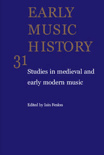
EARLY MUSIC HISTORY
Delving into the Depths of Early MusicEARLY MUSIC HISTORY is an esteemed academic journal published by Cambridge University Press, specializing in the rich and diverse field of early music, providing a vital platform for research and discourse since its inception. With an ISSN of 0261-1279 and an E-ISSN of 1474-0559, the journal operates from its headquarters in Cambridge, United Kingdom. Known for its scholarly rigor, EARLY MUSIC HISTORY is ranked within the Q2 category in Music, illustrating its significant contribution to the field. The journal covers a broad time frame, examining musical developments from the medieval to the early modern period, and features articles that seek to illuminate historical contexts and contemporary implications of early music practices. Despite lacking the Open Access option, it remains a valued resource for researchers and professionals seeking to advance their understanding of this dynamic area of study. The journal not only fosters a deeper appreciation of early music history but also positions itself as a pivotal contributor to ongoing academic dialogue, making it essential reading for scholars in the arts and humanities.
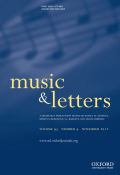
MUSIC & LETTERS
Illuminating the Intersections of Culture and CompositionMUSIC & LETTERS, published by Oxford University Press, is a prominent academic journal that has been at the forefront of musicology and music studies since its inception in 1920. With an ISSN of 0027-4224 and an E-ISSN of 1477-4631, the journal provides a platform for scholarly articles that explore the rich interplay between music and literature, contributing significantly to the understanding of musical context, form, and societal impact. As of 2023, it holds a respectable Q3 rank in Music within its category, positioned at Rank #66 out of 180 in the Scopus Arts and Humanities Music category. Despite not being an Open Access journal, its rigorous peer-review process and commitment to high-quality research make it an essential resource for researchers, professionals, and students alike. The journal's scope encompasses various genres and historical periods, ensuring a comprehensive examination of music's role in culture and community, thereby enhancing the scholarly discourse within this vibrant field. Based in the United Kingdom, at Great Clarendon St, Oxford OX2 6DP, England, MUSIC & LETTERS continues to inspire and inform the global music scholarly community.
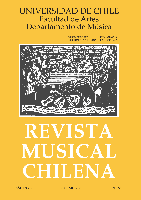
Revista Musical Chilena
Advancing Scholarship in Music and Cultural StudiesRevista Musical Chilena, an esteemed publication from the Faculty of Arts at Universidad de Chile, has been a pivotal platform in the field of music and cultural studies since its inception in 1945. With a commitment to open access, this journal promotes the dissemination of innovative research and critical discourse that bridges the gap between cultural theory and musical practice. Holding a notable Q2 ranking in both the Cultural Studies and Music categories as of 2023, it serves as a vital resource for scholars and professionals alike. The journal's inclusion in the Scopus database, with rankings that reflect its influence in the arts and humanities, underscores its significance in shaping the contemporary landscape of music studies. Given its convergence of research output from 2007 to 2024, Revista Musical Chilena continues to engage its audience with diverse scholarship that reflects Chilean musical heritage and global cultural dynamics.
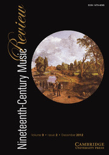
Nineteenth-Century Music Review
Connecting Music and Society Through TimeNineteenth-Century Music Review, published by CAMBRIDGE UNIVERSITY PRESS, is an essential scholarly journal in the field of musicology, particularly focusing on the vibrant and transformative period of the nineteenth century. This journal, archived under ISSN 1479-4098 and E-ISSN 2044-8414, serves as an invaluable platform for researchers, professionals, and students alike who are dedicated to exploring the multifaceted interactions between music and society during a time of significant cultural change. With its commitment to high-quality research and critical discourse, it embraces a diverse range of topics, including historical analysis, performance practice, and socio-cultural contexts within music. Operating from the United Kingdom, Nineteenth-Century Music Review is currently categorized in the fourth quartile of music journals according to Scopus rankings, offering a unique opportunity for emerging scholars to contribute to the expanding dialogue in this niche while also reaching a broad audience within the arts and humanities. Although the journal follows a traditional subscription-based model, it continues to be a pivotal resource for academic inquiry and knowledge dissemination in the landscape of nineteenth-century music history.
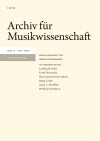
ARCHIV FUR MUSIKWISSENSCHAFT
Advancing Knowledge in Music Theory and HistoryARCHIV FUR MUSIKWISSENSCHAFT, the esteemed journal published by FRANZ STEINER VERLAG GMBH, serves as a significant platform for the dissemination of scholarly research in the field of musicology. With an ISSN of 0003-9292 and an established history of publication reaching back to 2002, this journal aims to explore various aspects of music theory, history, and ethnomusicology, contributing to academic discourse within a vibrant global community. Despite its designation in the Q4 category for music in 2023, the journal continues to foster innovative research and discussions among budding musicians, established academics, and music enthusiasts alike. While Open Access options are not currently available, the journal's offerings are enriched by a thorough review process aimed at maintaining high academic standards. Located in Stuttgart, Germany, at BIRKENWALDSTRASSE 44, D-70191, ARCHIV FUR MUSIKWISSENSCHAFT is committed to engaging its readers through insightful articles and reveals the evolving landscape of music scholarship while remaining a resourceful tool for researchers and students pursuing knowledge in this captivating field.